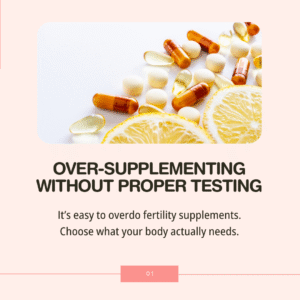Trying to Conceive? 5 Common Mistakes That Could Be Hurting Your Fertility
You’ve revamped your diet, taken all the recommended supplements, and overhauled your lifestyle. Yet, each month ends in disappointment as your period arrives. It’s natural to wonder: “Am I missing something?“
You’re not alone. Many women face similar challenges when trying to conceive. In this blog, we explore five common mistakes that might be affecting your fertility and how to address them.
1. Over-Supplementing Without Proper Testing

In the age of social media wellness advice, it’s easy to be tempted by a cocktail of fertility supplements. But more doesn’t always mean better.
A systematic review found that while antioxidants like vitamin D, omega-3s, and CoQ10 show some promising results in Assisted Reproductive Technology (ART) settings, their influence on live birth rates remains inconsistent. This suggests that supplementing without a clear clinical indication may not improve fertility outcomes and could increase costs or risks unnecessarily.
A 2024 lifestyle literature review emphasised that while folic acid is critical for reproductive health, excessive intake without assessing vitamin B12 level can lead to undetected deficiencies, which are known to affect fertility negatively.
Tip: Get your blood tests done and work with a fertility dietitian to personalise your supplement routine. Targeted support is far more effective and safer than guesswork.
2. Using GLP-1 Medications Without a Fertility Nutrition Plan

GLP-1 medications like Ozempic (semaglutide) and Mounjaro (tirzepatide) are commonly prescribed for managing type 2 diabetes and supporting weight loss. However, emerging research also suggests they may help improve fertility outcomes, especially in women with PCOS who are overweight or obese.
A 2025 review highlights that GLP-1s act on both metabolic and hormonal pathways, helping to regulate blood sugar, reduce appetite, and promote weight loss. These changes can improve insulin sensitivity, lower androgen levels, and help restore ovulation. All of which are critical for enhancing fertility in PCOS.
However, when using GLP-1s while trying to conceive, nutrition becomes even more important. These medications can:
- Blunt your appetite, leading to undereating or missing key nutrients.
- Increase the risk of micronutrient deficiencies, such as iron, folate, and choline, which are essential nutrients for egg health, implantation, and early pregnancy.
- Contribute to muscle loss, which can disrupt hormone balance and reduce metabolic resilience.
Tip: If you’re using GLP-1s and planning a pregnancy, speak with your doctor about your fertility timeline. It’s also wise to work with a fertility dietitian to develop a personalised nutrition plan that supports weight loss while maintaining muscle mass and nutrient sufficiency.
Keep in mind that most GLP-1s require a washout period of at least 3 months before trying to conceive, to reduce potential risks in early pregnancy.
3. Cutting Out All Fats from Your Diet

The word “fat” still carries a lot of stigma, but eliminating fats can sabotage your fertility. Not all fats are unhealthy. Certain fats are essential for hormone production, egg development, and reproductive function.
One recent study found that a targeted nutrition plan including olive oil, a vitamin D and omega-3 enriched supplement, and an olive oil-based spread significantly changed the fatty acid profile of the fluid surrounding developing eggs (follicular fluid) in women undergoing IVF.
Women who consumed more healthy fats had higher levels of anti-inflammatory omega-3 fatty acids (EPA and DHA) and lower levels of inflammatory omega-6 fatty acids, suggesting that their egg environment was more supportive of development.
Supporting this, a large meta-analysis involving nearly 6,000 women found that omega-3 intake was associated with a 74% higher chance of pregnancy through fertility treatment, a 36% increase in natural conception, and more than double the fertilisation rates. While the studies varied in design, the evidence points clearly to the importance of including healthy fats in a fertility-focused diet.
Tip: Make room for foods like avocados, extra virgin olive oil, walnuts, flaxseeds, chia seeds, and fatty fish. These fats are not only safe, they’re essential for hormonal balance, egg health, and preparing your body for pregnancy.
4. Over-Exercising or Overtraining

Regular movement is essential for overall health, but when you’re trying to conceive, more isn’t always better. There’s a tipping point where intense or excessive exercise can hinder fertility.
High-intensity workouts can elevate cortisol, a stress hormone that may disrupt ovulation and shorten the luteal phase, both of which are key factors in conception. Despite this, many women undergoing fertility treatment continue with unsupportive exercise routines without adjusting for their hormonal and metabolic needs.
Tip: Choose fertility-friendly movements like walking, gentle yoga, Pilates, or light strength training a few times per week especially when you’re on fertility treatment.
For tailored support, consider consulting an accredited exercise physiologist who understands the unique demands of fertility and hormone balance.
5. Neglecting Sleep and Stress Management

Modern life is busy, overwhelming, and often exhausting, but chronic stress and poor sleep can quietly disrupt your fertility more than you might realise.
A study of 157 women undergoing IVF found a significant link between stress and poor sleep quality. Using the Perceived Stress Scale and Pittsburgh Sleep Quality Index, researchers observed that as stress increased during key stages of treatment, egg retrieval, embryo transfer, and pregnancy testing, sleep quality declined. These findings highlight the need to prioritise stress management and sleep support as part of a holistic fertility care plan.
Tip: Aim for 7–9 hours of quality sleep. Consider guided meditations, journaling, or professional counselling to support emotional well-being.
Bottom Line
- More supplements don’t automatically mean better fertility. Without the right testing and personalised guidance especially if you’re on GLP-1 medications, you might be missing what your body truly needs
- Nutrition matters at every step in supporting your fertility.
- Managing stress, getting enough sleep, and moving your body in a balanced way helps signal safety—and sets the stage for conception.
